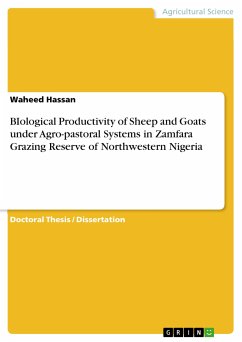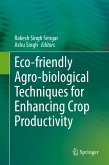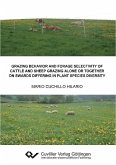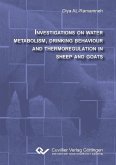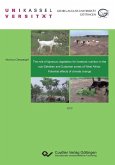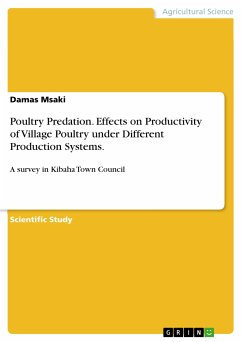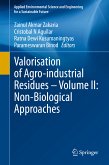Doctoral Thesis / Dissertation from the year 2020 in the subject Agrarian Studies, Justus-Liebig-University Giessen (Institut fuer Nutztierecologie), course: Animal Breeding and Genetics, language: English, abstract: The present study had as its main objective an on-farm characterization of the biological productivity of sheep and goats in the Zamfara Reserve. Sheep and goats form an integral part of most farming systems in Nigeria with over 70 % of the rural households keeping an average of five animals each. The animals are kept mainly for meat production but they also have diverse roles in the sociocultural and economic life of their owners. The population of sheep and goats in Nigeria was estimated at 33.864 million and 21.784 million, respectively. Over 90 % of these animals are kept under village and pastoral systems. Sheep and goats constitute a large proportion of domestic ruminants in Nigeria. The animals contribute about 35 % of the meat consumed in the nation, although they only contribute 10 % of the ruminant biomass. They also provide milk for human consumption, skin for the leather industry, bone and blood meals for livestock feeding as well as manure for the improvement of soil fertility. In the rural areas, sheep and goats contribute significantly to the nutrition, ecological, socio-economic and socio-cultural well-being of most households. Their socioeconomic importance in rural settlements in Nigeria include, among others, usage as a source of liquidity, means of exchange for labour and usage during ceremonies and religious festivals. However, sheep and goats have remained grossly under-exploited as resources for economic development. The most likely motivation for villagers to improve the productivity of their small ruminants is economic: the opportunity to increase cash income through the sales of animals. Improved productivity of sheep and goats will help towards alleviating rural poverty and improving the living standard of the rural poor.
Dieser Download kann aus rechtlichen Gründen nur mit Rechnungsadresse in A, B, BG, CY, CZ, D, DK, EW, E, FIN, F, GR, HR, H, IRL, I, LT, L, LR, M, NL, PL, P, R, S, SLO, SK ausgeliefert werden.

